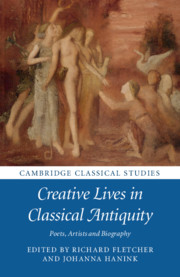Book contents
- Frontmatter
- Contents
- List of contributors
- List of illustrations
- Part I Opening remarks
- 1 Orientation: what we mean by ‘creative lives’
- 2 ‘Lives’ as parameter: the privileging of ancient lives as a category of research, c. 1900
- Part II Reviving dead poets
- Part III Lives in unexpected places
- Part IV Laughing matters and Lives of the mind
- Part V Portraits of the artist
- Works cited
- Index
2 - ‘Lives’ as parameter: the privileging of ancient lives as a category of research, c. 1900
from Part I - Opening remarks
Published online by Cambridge University Press: 01 December 2016
- Frontmatter
- Contents
- List of contributors
- List of illustrations
- Part I Opening remarks
- 1 Orientation: what we mean by ‘creative lives’
- 2 ‘Lives’ as parameter: the privileging of ancient lives as a category of research, c. 1900
- Part II Reviving dead poets
- Part III Lives in unexpected places
- Part IV Laughing matters and Lives of the mind
- Part V Portraits of the artist
- Works cited
- Index
Summary
In their ‘Orientation’, Johanna Hanink and Richard Fletcher speak of ancient biographies as ‘telling receptions of creative work’ that reward close analysis as finely wrought items in their own right. They do so with a view to the consequences that this ought to have for our own attitude towards the biographical, as ancient sources and modern tools alike. This ‘we’ behind ‘our attitude’ presumably refers not only to the modern reader, artist and writer but also to the classical scholar, and the scholarly literature on ancient biography itself thus warrants equal attention as an act of reception, no less telling or finely wrought.
For those in need of an introduction to ancient biography, Momigliano's The Development of Greek Biography (1971; 1993) remains in many ways the reliable and deserved go-to work. A close look at Momigliano's careful historiography and bibliography suggests that there was in fact a whole cluster of German works roughly around 1900 that signalled particular interest in the nature of bioi as a genre, a cluster represented for example by the studies of Bruns (1896), Leo (1901) or Misch (1907). German academic fashions can have a long life, and this group of works is even now regularly referred to in the literature on ancient biography. The peak, at the turn of the century, of interest in biography and the biographical as a form of interpretation of ancient works is a story that is itself revealing about the parameters of classical scholarship and its relationship to creative practices.
Allowing for reservations and modifications, Momigliano's work engages closely with the question about the importance of an Aristotelian and Peripatetic model for the development of Hellenistic and ultimately Roman-era biographical writing, essentially the argument of Friedrich Leo's Die griechisch-römische Biographie nach ihrer literarischen Form (1901). For Leo, the teleological thinking about character that distinguished the Peripatos was at the root of a subsequent forking into two ‘traditions’: on the one hand, that of the Alexandrian grammarians and their compilations of lives, an approach that later gave Suetonius a grid of categories on which information could be variably distributed; and on the other hand, the narrative elaboration of a Plutarch who aimed at presenting the ‘overall image of a personality’.
- Type
- Chapter
- Information
- Creative Lives in Classical AntiquityPoets, Artists and Biography, pp. 29 - 48Publisher: Cambridge University PressPrint publication year: 2016
- 2
- Cited by



